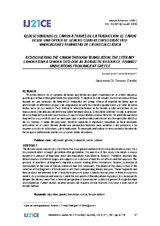Mostrar el registro sencillo del ítem
Redescubriendo el canon a través de la traducción. El canon desde una óptica de género como recurso didáctico
| dc.contributor.author | Tinedo Rodríguez, Antonio Jesús | |
| dc.date.accessioned | 2023-02-22T12:29:24Z | |
| dc.date.available | 2023-02-22T12:29:24Z | |
| dc.date.issued | 2021 | |
| dc.identifier.issn | 2444-3921 | |
| dc.identifier.uri | http://hdl.handle.net/10396/24767 | |
| dc.description.abstract | El canon literario es un conjunto de textos que tienen una gran importancia en el ámbito educativo puesto que se transmiten generación tras generación. El objetivo de este estudio es crear un corpus textual basado en una selección de fragmentos traducidos del griego clásico al español de forma que el profesorado de diferentes etapas y de asignaturas de corte humanístico pueda hacer uso tanto de estos textos como de sus análisis. Para realizar la selección textual se ha llevado a cabo una lectura de las traducciones y de artículos de referencia sobre literatura clásica. El resultado obtenido ha sido la selección de cinco fragmentos de poemas clásicos con sus correspondientes análisis literarios. Se pretende que estos fragmentos y sus análisis sean un base para que el profesorado pueda hacer una transposición didáctica de los mismos. A modo de conclusión, teniendo presente la legislación educativa, se hace necesario profundizar en el canon literario desde una perspectiva feminista para visibilizar y dar presencia a las mujeres a través de la literatura y de la traducción. Es necesario profundizar en otros periodos literarios de forma que el profesorado cuente con un canon sólido de autoras. | es_ES |
| dc.description.abstract | The literary canon consists of a set of texts that have great importance in the educational arena since it is a key element which is taught generation after generation. The objective of this study is to create a corpus based on a selection of fragments which are translations from Greek to Spanish. Therefore, teachers who deliver courses of different stages and subjects can make use of both the set of texts and their analysis. The process of selections of fragments required a closed reading of the translations. Besides, a revision of manuscripts on the topic of Classic Literature was also necessary. The results of this study consist of the selection of five fragments of Greek poems with their corresponding literary analyses. These fragments and their analysis are intended to be a basis for teachers to make a didactic transposition of them in case they need it. As a conclusion and bearing in mind the last update of the educational legislation, it is necessary to deepen the literary canon from a feminist perspective to make women visible and present through literature and translation. Further studies on other periods are required so that teachers may have a solid canon of female authors. | es_ES |
| dc.format.mimetype | application/pdf | es_ES |
| dc.language.iso | spa | es_ES |
| dc.publisher | Universidad de Córdoba, UCOPress | es_ES |
| dc.rights | https://creativecommons.org/licenses/by-nc-nd/4.0/ | es_ES |
| dc.source | International Journal for 21st Century Education 8 (1), 67-79 (2021) | es_ES |
| dc.subject | Educación | es_ES |
| dc.subject | Género | es_ES |
| dc.subject | Traducción | es_ES |
| dc.subject | Canon | es_ES |
| dc.subject | Autoras | es_ES |
| dc.subject | Education | es_ES |
| dc.subject | Gender | es_ES |
| dc.subject | Translation | es_ES |
| dc.subject | Female authors | es_ES |
| dc.title | Redescubriendo el canon a través de la traducción. El canon desde una óptica de género como recurso didáctico | es_ES |
| dc.title.alternative | Rediscovering the canon through translation. The literary canon from a gender outlook as a didactic resource: feminist vindications from ancient Greece | es_ES |
| dc.type | info:eu-repo/semantics/article | es_ES |
| dc.relation.publisherversion | http://www.uco.es/ucopress/ojs/index.php/ij21ce/index | es_ES |
| dc.rights.accessRights | info:eu-repo/semantics/openAccess | es_ES |

